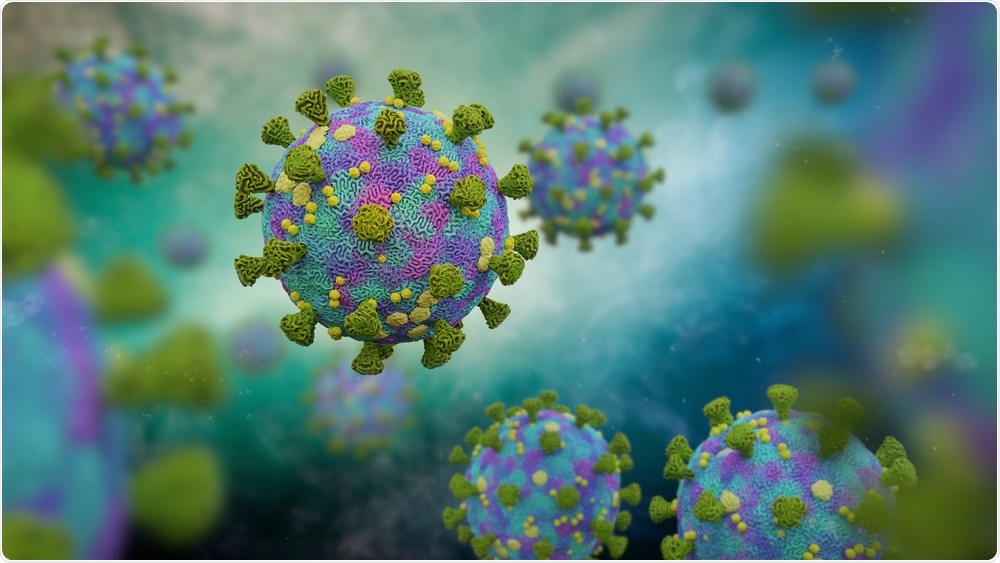According to a new study, non-steroidal anti-inflammatory drugs (NSAIDs) decreased both inflammatory and antibody responses to SARS-CoV-2 infection in mice. The study was recently published in the Journal of Virology— a publication of the American Society for Microbiology.

SARS-CoV-2. Image Credit: Dotted Yeti/Shutterstock.com
The new study is crucial because “NSAIDs are arguably the most commonly used anti-inflammatory medications,” stated principal investigator Craig B. Wilen, Assistant Professor of Laboratory Medicine and Immunology, Yale University School of Medicine.
Apart from taking NSAIDs for chronic conditions, like arthritis, individuals take them “for shorter periods of time during infections, and [during] acute inflammation as experienced with COVID-19, and for side effects from vaccination, such as soreness, fever, and malaise,” stated Dr. Wilen.
Our work suggests that the NSAID meloxicam dampens the immune response to SARS-CoV-2 infection.”
Craig B. Wilen, Study Principal Investigator and Assistant Professor of Laboratory Medicine and Immunology, Yale University School of Medicine
Besides this, the study indicates that the consequences of NSAID use at the time of natural infection and vaccination must be assessed in human beings, added Dr. Wilen.
“This data likely exists, particularly in the clinical trials for the vaccines, so it should be mined to see if it produces antibody responses in people. Taking NSAIDs during COVID-19 could be harmful or beneficial, depending on the timing of administration.”
Craig B. Wilen, Study Principal Investigator and Assistant Professor of Laboratory Medicine and Immunology, Yale University School of Medicine
According to him, the powerful anti-inflammatory, dexamethasone (which is not an NSAID), is harmful to COVID-19 patients when taken during the early stages of the infection, but useful when administered during the later stages of the disease.
Likewise, the anti-inflammatory activity of NSAIDs may be harmful if they are taken during the early stages of SARS-CoV-2 infection because inflammation at this stage is generally helpful at this stage. But this fact changes at the later stages of the COVID-19 infection, specifically if the patient experience an intense inflammation, called a cytokine storm.
A cytokine storm can be defined as an immune response of inflammatory compounds that frequently take place in COVID-19 patients. It can result in complications, require the intensive care unit, and sometimes, even lead to death.
Reduced neutralizing antibodies induced by NSAIDs may be harmless, or it may weaken the ability of the immune system to combat the COVID-19 disease during the early stages of infection. It may even decrease the magnitude and/or length of protection from natural infection or vaccination added Dr. Wilen.
The initial push to explore the effect of NSAID on COVID-19 disease “was a twitter thread, suggesting NSAIDs should not be used during COVID-19, this seemed suspicious to us, so we wanted to investigate,” Dr. Wilen further added.
According to Dr. Wilen and his team, there would be little to no effect of NSAIDs on viral infection, which turned out to be actually right. The team also assumed that NSAIDs would not has a considerable effect on the antibody response to natural infection.
In fact, we initially didn't even carefully look at the antibody response, because we didn't expect it to be altered by NSAIDs. This turned out to be wrong.”
Craig B. Wilen, Study Principal Investigator and Assistant Professor of Laboratory Medicine and Immunology, Yale University School of Medicine
Source:
Journal reference:
Chen, J. S., et al. (2021) Non-steroidal anti-inflammatory drugs dampen the cytokine and antibody response to SARS-CoV-2 infection. Journal of Virology. doi.org/10.1128/JVI.00014-21.